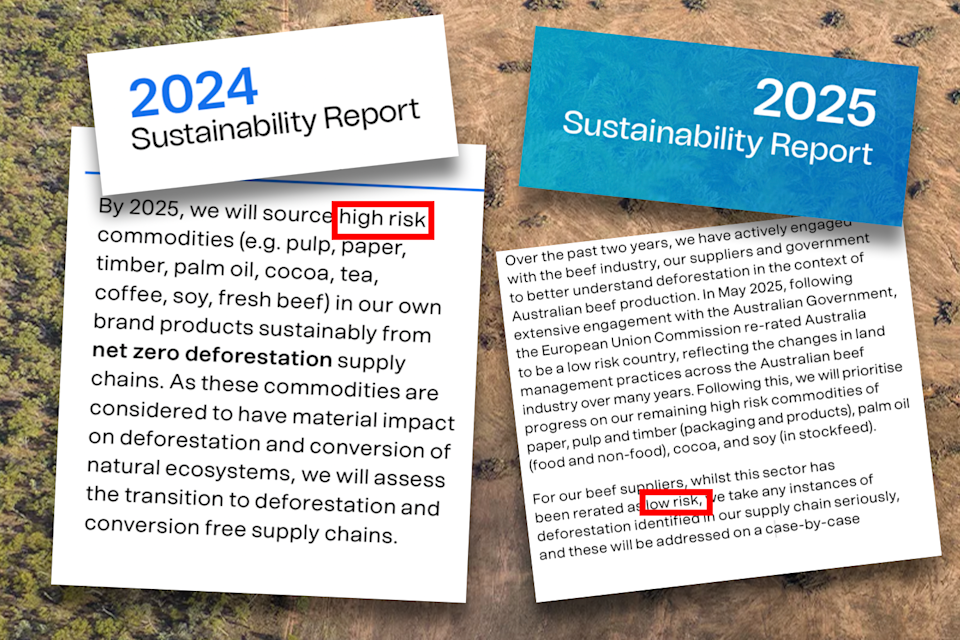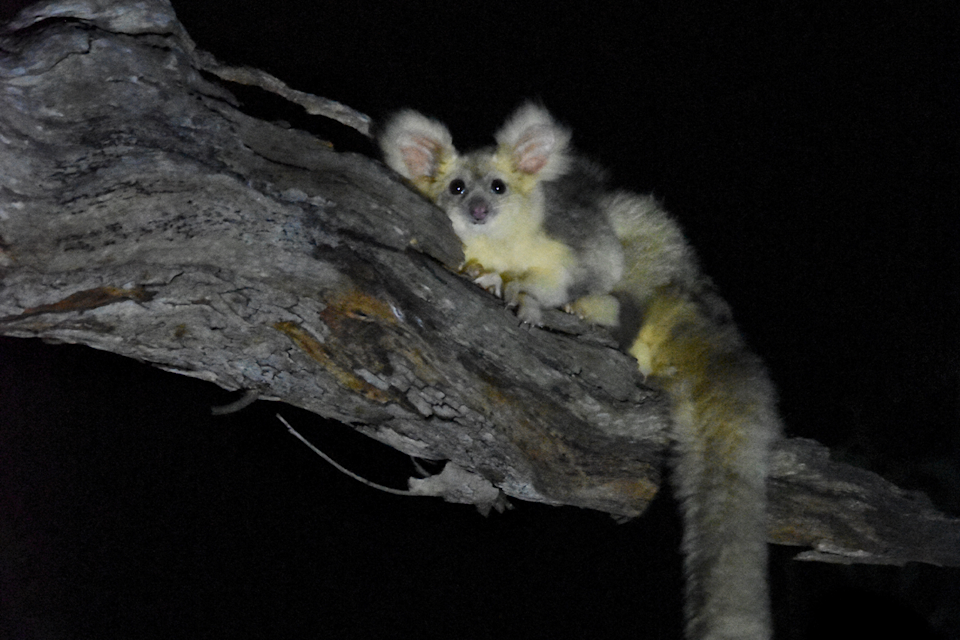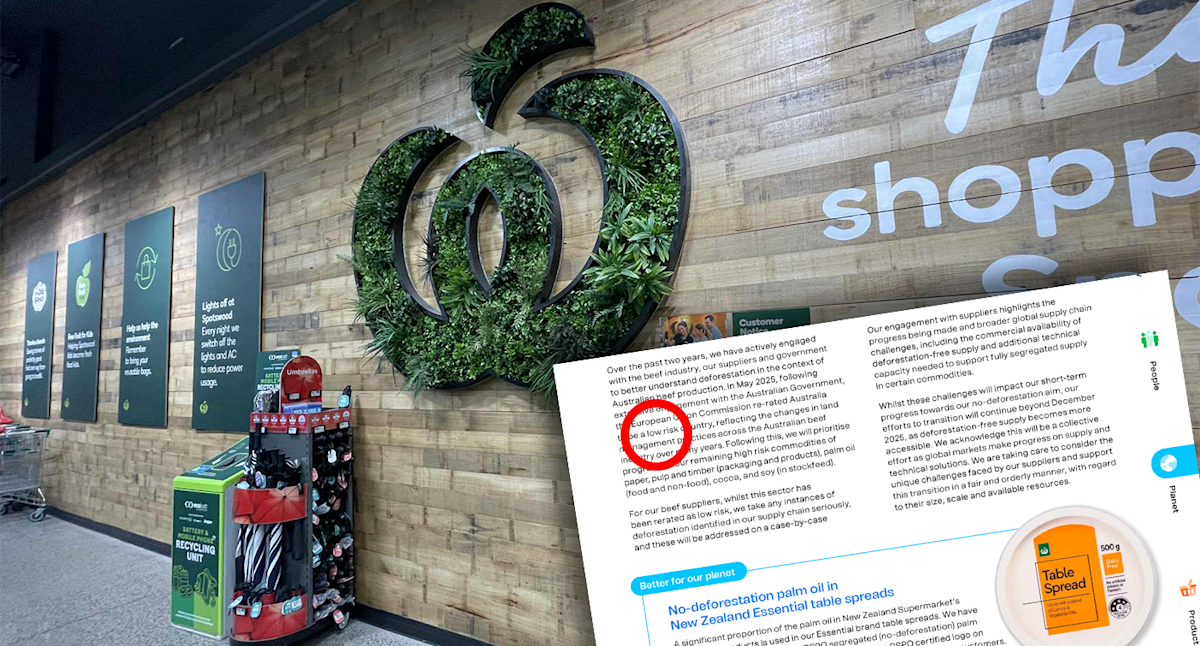A single word change in a new Woolworths document has sparked concern the company has quietly diluted a key conservation goal of stamping out deforestation from its supply chain. In its 2025 Sustainability Report, the supermarket giant updated the description of Australian fresh beef as “low” risk, despite its production being a leading cause of forest removal in Queensland and NSW.
Just a year earlier, Woolworths had listed it as “high” risk alongside some of the world’s most notoriously destructive ingredients, including:
Palm oil, which is linked over 30 million hectares of deforestation in Southeast Asia.
Soy, a major livestock feed, which is planted on bulldozed and burned Amazon rainforest.
Cocoa, which has led to the felling of critical wildlife habitat in West Africa.
And also tea, coffee, pulp, paper and timber.
These other commodities remain in the 2025 sustainability report, and Woolworths told Yahoo News, it believes they pose a “higher risk than Australian beef”. It claims to remain “steadfast in [its] support for a no-deforestation supply chain”.
But Australia’s leading conservation groups aren’t convinced by its assurances. And they’ve accused the retailer of being unclear about how it plans to ensure the beef it purchases is not linked to deforestation.

Woolworths changed beef from high risk to low risk. Source: Woolworths
Change in beef classification dubbed ‘laughable’
The Wilderness Society said Woolworths’ new risk assessment of beef “simply doesn’t add up”, saying the retailer must ensure the products on its shelves aren’t linked to bulldozed wildlife habitat.
“Woolworths conveniently removed fresh beef as a priority commodity from its no deforestation goal. This is laughable,” its Queensland campaigns manager Hannah Schuch said.
Australian Conservation Foundation (ACF) labelled Woolworth’s change “extremely worrying”, noting all evidence suggests the expansion of animal agriculture is the number one driver of woodland destruction in Australia – the only developed nation considered a “deforestation hotspot”.
The most recent government data from Queensland, the state where the majority of Australia’s land clearing occurs, shows 332,015 hectares of woody vegetation was removed, an increase on the previous year. Analysis indicates 86 per cent was to make way for pasture.
Why did Woolworths change its assessment of beef?
Nat Pelle, the ACF’s nature and business lead, spoke to Yahoo on Thursday afternoon after meeting with Woolworths. Because the retailer is the biggest buyer of Australian processed beef (approximately 7 per cent), he believes its decision is a signal to the industry that it doesn’t need to take further action on tackling deforestation.
In its report, Woolworths said the changes were made after it “actively engaged” with the beef industry, its suppliers, and the government to “better understand” production. It also noted that both the European Commission has also re-rated Australia as being a low-risk. “We prioritise our highest risk primary deforestation-linked commodities. Should current assessments change, we will review our approach and reprioritise,” it said.
But Pelle argues there has been little transparency from the European Commission on how it made its decision, and that it came after Australian government lobbying. There are indications Australia’s increase in net forest cover was considered, but the main driver of this extra coverage was new forest that sprang up after several unseasonably wet years.
“In no way does regrowth make up for the loss of ecosystems that are thousands of years that have been bulldozed, because they are irreplaceable,” Pelle said.
“There are many species of Australian animals that require forests to be decades old for them to provide habitat. Species like greater gliders need hollows that take up to a century to develop in trees, and new saplings aren’t any compensation.”

Species like endangered greater gliders live inside tree hollows, which take over 100 years to form. Source: Getty
Woolworths committed to deforestation ‘goal’
It remains unclear as to whether Woolworths has told its suppliers they need to be deforestation-free, or whether it is a requirement that they be deforestation-free. But in a statement, the company said it takes “any instances of deforestation” identified in its supply chain “seriously”.
“These will be addressed on a case-by-case basis, firstly seeking to understand the specific circumstances, and working collaboratively to develop agreed actions to support progress towards our goal,” it said.
Woolworths added that it remains committed to its “goal” of eliminating deforestation by December 31, 2025.
“Beef remains part of our no deforestation goal, and we actively engage with both our own and vendor suppliers to support progress towards deforestation-free supply chains,” it said.
But Pelle is concerned about the nature of the word “goal”. “I have a goal to take more holidays in the future. What it’s saying doesn’t read like a solid commitment,” he said.
Love Australia’s weird and wonderful environment? 🐊🦘😳 Get our new newsletter showcasing the week’s best stories.


